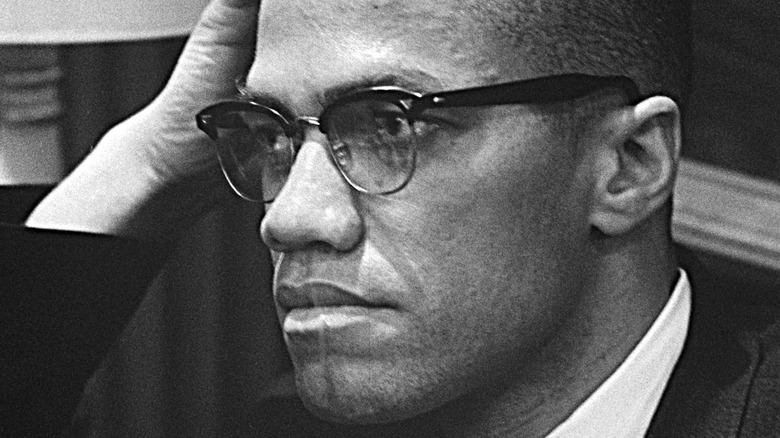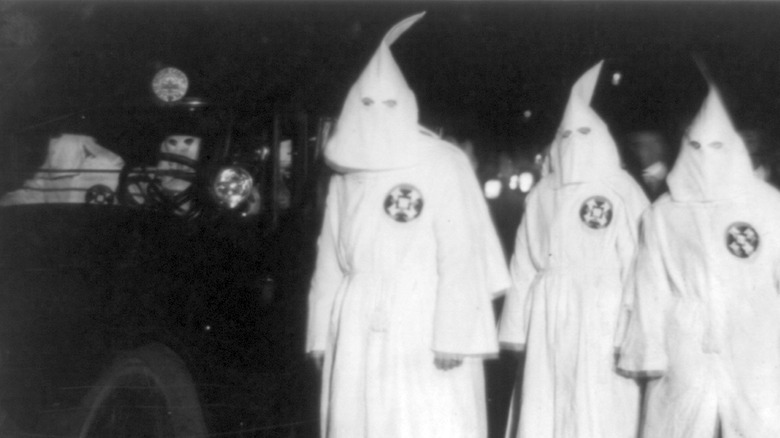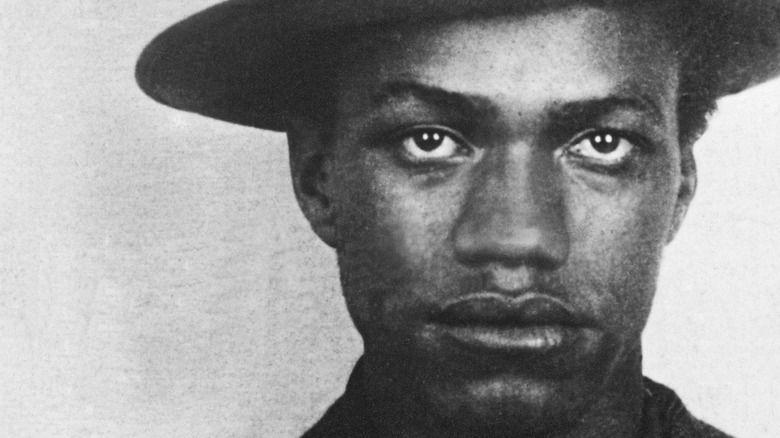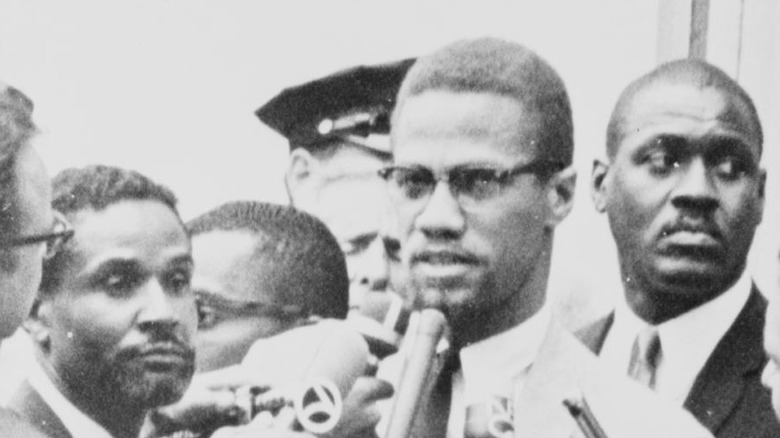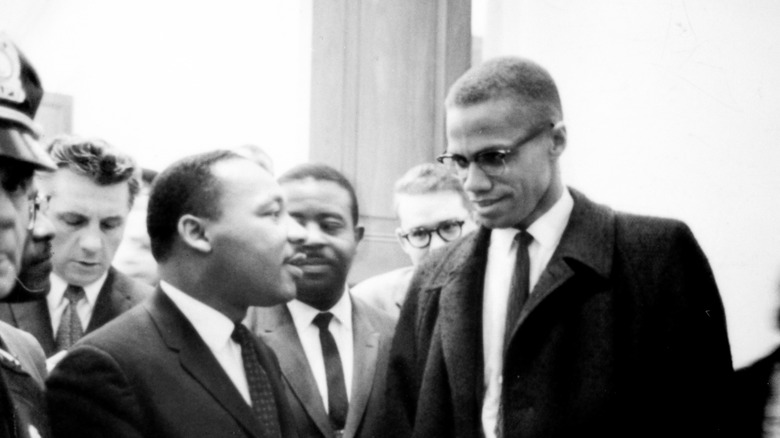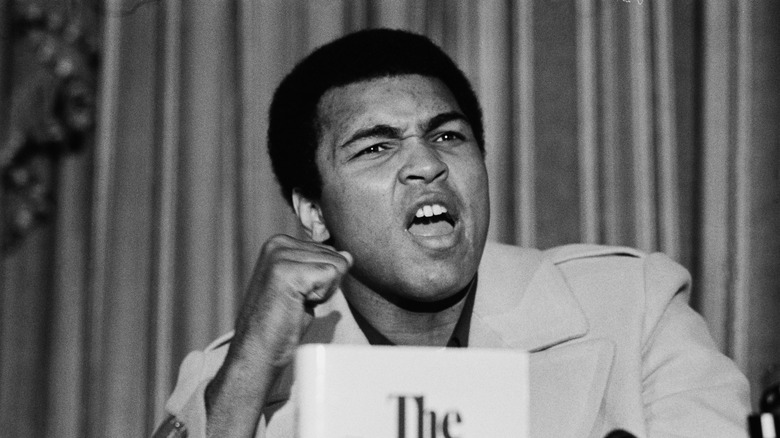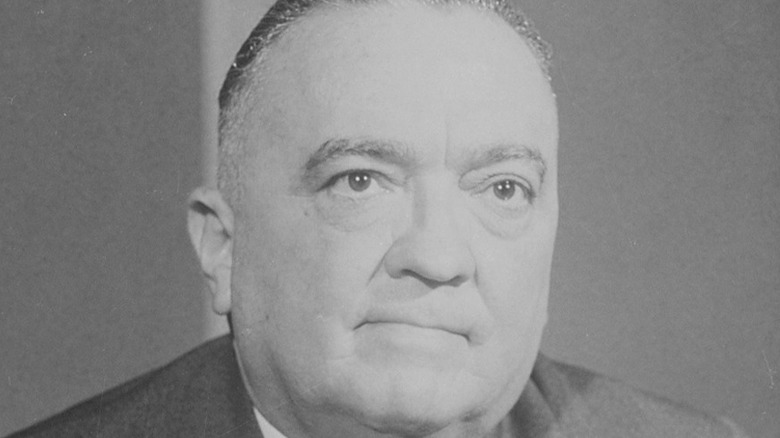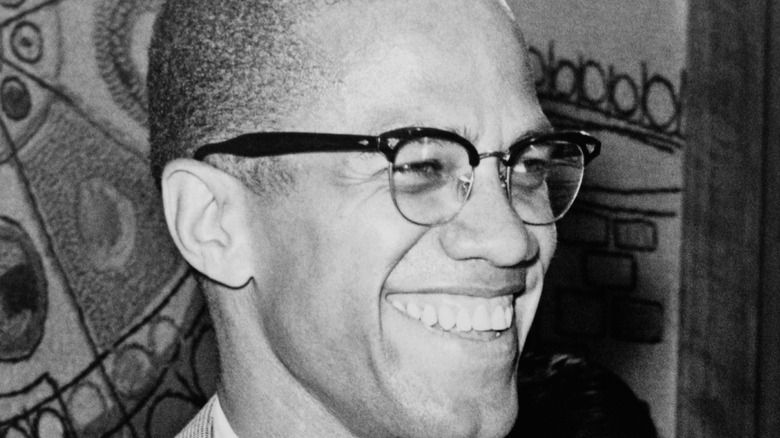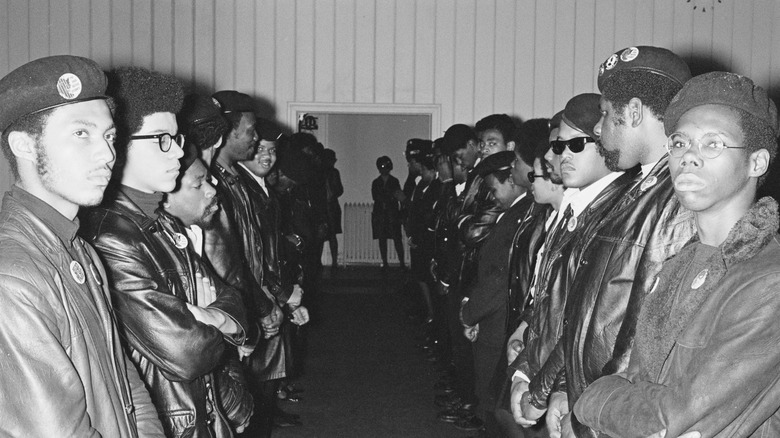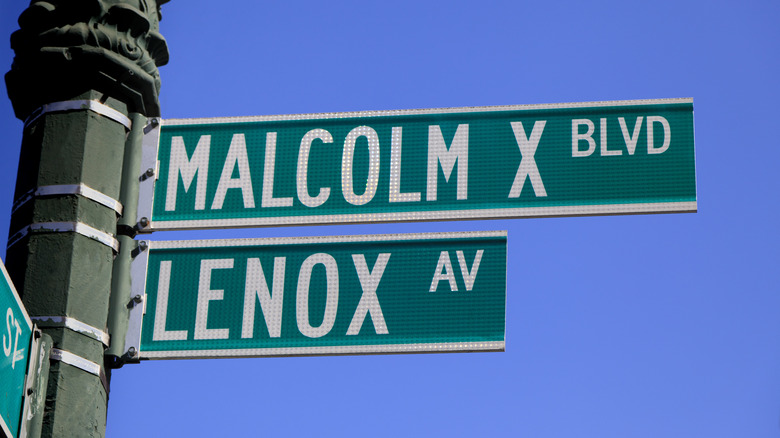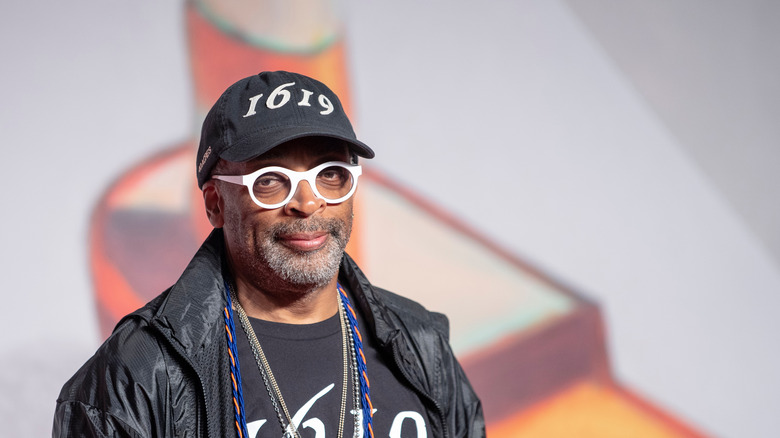The Untold Truth Of Malcolm X
Whether one remembers him as Malcolm Little, Malcolm X, or el-Hajj Malik el-Shabazz, the influence that the man had on American society and the Civil Rights Movement during his brief life was monumental. Known for his engaging public speaking, undeniable charm, and ability to organize people, he was an inspiration during his life (and after) to many who had doubts or had become disillusioned by Martin Luther King Jr.'s more moderate ideologies of integrating society through non-violent civil disobedience (per Britannica).
Yet, like many historical figures, much of what is remembered about Malcolm X and his legacy has been simplified and sometimes even distorted in the decades since his death. He was a complex figure whose views evolved over his lifetime, a man who faced criticism from King for his "destructive demagoguery," but also a man who eventually embraced a more optimistic outlook, eventually believing that there could be a happy ending to America's race problem (per Biography). However one views him, it is undeniable that he is one of the most important and consequential historical figures of the twentieth century — and one whose legacy, much like his own views, continues to evolve.
His family was run out of Nebraska by the Ku Klux Klan
On May 19, 1925, Malcolm X, then known as Malcolm Little, was born in Omaha, Nebraska, to Louise and Earl Little. As described by Biography, his mother stayed at home, and his father was an outspoken preacher who made his stance on civil rights known while also being involved in many local civil rights organizations. This caused a lot of friction between the Little family and the white community of Omaha. The local Ku Klux Klan chapter and other white supremacist groups often targeted the family with harassment. During one notable incident, while Malcolm was still inside his mother's womb, armed Klansmen arrived at their house on horseback, demanding that Earl stop "spreading trouble" (per PBS).
History Nebraska describes how this harassment eventually led to the family's relocation to Milwaukee and then Lansing, Michigan, during young Malcolm's most formative years. According to the National Park Service, the Little family home has since been demolished in Omaha, but a historical marker now stands in its place, highlighting the childhood home of Malcolm and his family as well as expressing the racism the family faced while residing there.
He had a difficult childhood
Young Malcolm was only 6 years old when he was faced with a gut-wrenching tragedy after the family's move to Michigan: the death of his father. According to original newspaper reports from 1931, Earl Little, who was then 41 years old, was run over by a streetcar (per Michigan State University). Reported witnesses said that Earl had initially boarded a streetcar and then, when he realized he had forgotten his coat, went back for it. When another streetcar passed, he allegedly chased after it but tragically fell and was caught under the rear cars.
Still, there are some who think there could be more to the story. In his older years, Malcolm himself stated that he believed his father had been the victim of an assassination made to look like an accident (per PBS). Lansing itself was a deeply segregated city at the time, after all, and Earl Little's views certainly would have ruffled more than a few feathers. According to History, Earl was a strong supporter of controversial Black nationalist civil rights leader Marcus Garvey. Whatever the case, it wasn't long after Earl's death that Louise Little fell deep into poverty, had a mental breakdown, and was institutionalized, leaving Malcolm to foster care for many years afterward (per New York Public Library).
After dropping out of school, he was nicknamed Detroit Red
With little direction in life, Malcolm dropped out of school at the age of 16 and took up a life of crime, first living in Boston with his half-sister and then relocating to Harlem, where he began hustling, burglarizing, and dealing drugs, earning the nickname of "Detroit Red" (per Columbia University). According to "The Autobiography of Malcolm X," he earned the nickname because people knew he was from Michigan but had never heard of Lansing, so Detroit stuck instead; the "Red" was due to the reddish tint of his hair (two of his friends with similar hair were nicknamed "Chicago Red" and "St. Louis Red" due to their respective hometowns).
Malcolm described how he began by dealing marijuana (it required very little experience), then worked his way up to selling cocaine and heroin, which required more savviness and instinctual recognition of undercover police. Eventually, Malcolm got the hang of it and learned to recognize the signs of something going wrong, avoid staying in one accommodation for too many nights in a row, and avoid getting caught when he was patted down by police (per "The Autobiography of Malcolm X").
He went to prison at 21
Eventually, the law caught up to Malcolm while he was back in Boston and busy burglarizing numerous homes. On January 26, 1946, at the age of 21, Malcolm was sentenced to 10 years in prison for these burglaries (per New York Public Library). As described by History, he didn't have the best of reputation at first while incarcerated at the Norfolk Prison, with his prison peers referring to him as "Satan" due to his constant verbal condemnation of the Bible and God. Yet, around this same time, he began obsessively reading books out of the prison's library (per The Guardian). He started first with the dictionary. "I saw the best thing I could do was get hold of a dictionary — to study, to learn some words," Malcolm wrote in his autobiography. "I'd never realized so many words existed!"
It was during this time that Malcolm's views began to change drastically, and after corresponding with Nation of Islam leader Elijah Muhammad, he converted to its unique form of Islam, embracing the concepts of Black empowerment and self-reliance (per History). It was also around this time that he officially dropped his surname of Little (which he believed represented his family's slaver oppressors) and took on the last name of "X." After over six years, he was finally released from prison, and he soon helped the Nation of Islam grow from a few hundred to tens of thousands of members, according to History.
Malcolm's views on race evolved
Malcolm X's views on race and race relations evolved significantly during his lifetime. Even though his father had died when Malcolm was very young, he might have been influenced by his father's embracing of the Black nationalist beliefs of Marcus Garvey. In prison, due to his readings and joining of the Nation of Islam, Malcolm X's views evolved yet again, and even after embracing a more militant and separatist stance on race relations — such as white people being "blue-eyed devils" who could never possibly live in peace with Black people (per History) — his belief system truly never stopped evolving throughout his life.
While often seen as the antithesis to Martin Luther King Jr.'s civil rights leadership and promotion of integration, a pilgrimage to Mecca, Saudi Arabia, in 1964 yet again seemed to alter the way in which Malcolm X understood the struggle for civil rights. As described by MalcolmX.com, soon after abandoning the Nation of Islam and rejecting its leader outright, he was inspired by the interaction he had with people of different cultures, races, and ethnicities who all seemed to integrate with one another in peace. This was also when he changed his name, yet again: this time to El-Hajj Malik El-Shabazz (per History). As described by Jet Magazine, Malcolm X died believing in equality and the brotherhood of all races, rejecting his former ideology of separatism.
In his final year, he became an unlikely ally of King's
Even having embraced a more moderate stance following Mecca, Malcolm X knew how divisive he was — particularly among white lawmakers. As a result, he used that as leverage to get politicians to support Martin Luther King Jr.'s vision. The two had surprisingly met only once while in Washington, D.C., to observe the Senate debating the Civil Rights Act of 1964 (per Mercury News). "I'm throwing myself into the heart of the civil rights struggle," Malcolm X told King during this brief exchange (per Biography).
When he arrived in Selma, Alabama, during the Selma Voting Rights Campaign, King was already sitting behind bars. King later said that had he not been jailed, he would have attempted to stop Malcolm X from coming to the demonstrations, although he admitted "personal respect" for him (per King Institute). Since King was behind bars, though, Malcolm X met with Coretta Scott King instead, informing her that he wasn't there to make her husband's job more difficult — he understood that his own presence in Selma would convince politicians to support King's more moderate stances. "I thought that if the white people understood what the alternative was that they would be more inclined to listen to your husband," Coretta recalled Malcolm X saying (via Washington University). Years later, Coretta reflected on the two assassinated civil rights icons, saying that she believed they would eventually have joined forces in the struggle for equality, according to the Sun-Sentinel.
He was close friends with Muhammad Ali before a falling out
While the 2020 Netflix film "One Night in Miami" portrayed a fictionalized account of an actual evening in which Malcolm X and Muhammad Ali spent some time together, the reality is that the two men did actually have a strong but brief friendship before a falling out. Ali was an established and increasingly respected boxer who privately was following a similar ideological path to Malcolm X, joining the Nation of Islam and turning away from Martin Luther King Jr.'s more well-known non-violent civil disobedience (per Biography). According to NPR, Malcolm was like both a father and a brother to Ali — almost certainly influencing his decision to change his name from Cassius Clay — until he was suspended by Nation of Islam leadership for his criticism of Elijah Muhammad's infidelity.
The two men never reconciled. In Ali's 2004 biography "The Soul of a Butterfly," he stated (via Newsweek): "Turning my back on Malcolm was one of the mistakes that I regret most in my life. I wish I'd been able to tell Malcolm I was sorry, that he was right about so many things." Unfortunately, Ali would never have that chance.
J. Edgar Hoover targeted Malcolm
Considering FBI Director J. Edgar Hoover's long history of surveillance (including a hostile view of Martin Luther King Jr.), it should come as no surprise that Hoover held an unfavorable view of Malcolm X. According to History, the FBI watched him closely from his release from prison until his death. Early FBI files on Malcolm X — of which dozens of files are now declassified — described Malcolm X as a communist who was part of the "Muslim Cult of Islam." Some historians have even suggested that Hoover may have even wanted Malcolm X killed. According to Time, on June 6, 1964, Hoover sent a telegram to New York City's FBI offices that said they needed to "do something about Malcolm X."
According to The New York Times, federal informants were even present during the assassination of Malcolm X, and Hoover's investigators did not disclose much of what was known during the subsequent investigation. He even directly told these informants to keep their identities secret, including during the police investigation (per USA Today).
There are still uncertainties about his assassination
For decades, the story told and often accepted at face value was that Malcolm X was killed by members of the Nation of Islam, a group he was once part of before he publicly denounced them. In 1966, two members of the Nation of Islam — Muhammad Aziz and Khalil Islam — were sentenced to prison for the killing along with Mujahid Abdul Halim, serving decades in prison until their release in the 1980s (per CNBC). Almost immediately, though, there was speculation that there may have been more going on leading up to the assassination. Two weeks after his death, Jet Magazine published an interview with a loyal friend of Malcolm's (who had also left the Nation of Islam), where he stated that he did not believe Elijah Muhammad's followers were responsible for the assassination.
In 2021, Aziz and the late Islam were finally exonerated, opening up a new chapter in the investigation of who is ultimately responsible for the death of Malcolm X. According to The New York Times, an investigation of nearly two years proved that the FBI and the New York Police Department had deliberately withheld important evidence during their trial that could have led Aziz and Islam being found not guilty. As for Mujahid Abdul Halim, who confessed to the killing, his conviction still stands — but many questions still remain.
He helped inspire the Black Power movement
Malcolm X was never a member of the Black Panther Party, but he did help inspire the Black Power movement from which it arose. As described by Britannica, his ideas of Black nationalism, self-reliance, and self-defense were ideological mainstays of the Black Power movement and even inspired the change in word usage from "negro" and "colored" to "Black" and "Afro-American." Stokely Carmichael, a former follower of Martin Luther King Jr.'s, coined the term "black power" in 1966 after Malcolm X's death, drawing on Malcolm's beliefs that Black communities should have agency in deciding their own futures (via Smithsonian). According to a 1966 letter by Julius Lester published in Sing Out!, Malcolm "cut through the chains on Black minds like a giant blow-torch" by saying things out loud that Black Americans were only thinking privately.
Giving the eulogy at his funeral, actor Ossie Davis stated that many people wanted Malcolm X to be shunned and labeled "a fanatic" and "a racist," but those people had never actually listened to him (via Jet Magazine). "The main thing that we must do, Malcolm often exclaimed, is to keep a united front so that our energy will not be wasted," Davis continued. "Those who disagreed with him most, nevertheless, followed him." With the rise of the Black Power movement following Malcolm X's death, the FBI labeled the Black Panther Party a "black extremist organization" and dedicated thousands of pages of files to their monitoring of them (per FBI).
1990 was proclaimed the year of Malcolm X
Following his death, the perception of Malcolm X as a radical, violent extremist persisted in many circles as well as much of the public consciousness. In 1990, 25 years after his death, an organization called the National Malcolm X Commemoration Commission formed and said that 1990 would be "the year of Malcolm X" (via Jet Magazine). The idea was to reframe the way in which the public viewed the man, and there were readings, speeches, and even a "We Remember Malcolm Day" planned for his birthday. Events included Dr. Betty Shabazz (Malcolm's widow), film director Spike Lee, Chuck D. of the rap group Public Enemy, and the Rev. Jesse Jackson (per The New York Times).
That same year, Dorothy Gilliam — the first Black woman reporter for The Washington Post — penned that she was worried that such a movement might "sanitize" his legacy, stating that his public memory might be whittled away similar to how Martin Luther King Jr. was remembered by many only for his "I Have a Dream Speech." Still, according to The New York Times, much of the energy was coming from a younger generation who admired his desire to challenge the entire system and had pride in his African ancestry.
Spike Lee almost lost control of his biographical film
Eventually, Spike Lee — who helped promote the events commemorating Malcolm X in 1990 — began development on a biographical film about the man's life starring actor Denzel Washington, who was fresh off his Academy Award win for "Glory" in 1988. According to Jet Magazine, though, Lee's film faced financial trouble during its filming when Warner Bros. refused to spend any more money after it went $5 million over budget and a bond company took over the financials. Part of the problem, according to the Los Angeles Times, was that Warner Bros. wanted a movie just over two hours, while Lee maintained he needed the film to be over three hours. Eventually, celebrities including Oprah Winfrey, Michael Jordan, Janet Jackson, Prince, Magic Johnson, and others helped bail out the film, which Lee stressed hadn't been loans or investments, but gifts from people who believed in the film (per The New York Times).
The gamble paid off — Washington received an Oscar nomination for his portrayal, and many critics highlighted it as one of the best films of the year. Roger Ebert called it one of the "great screen biographies" and considered it the best film of the year. In the year 2000, Ebert and filmmaker Martin Scorsese had a conversation ranking their ten favorite films of the 1990s, and both included the film in their top ten of the entire decade (via RogerEbert.com).
